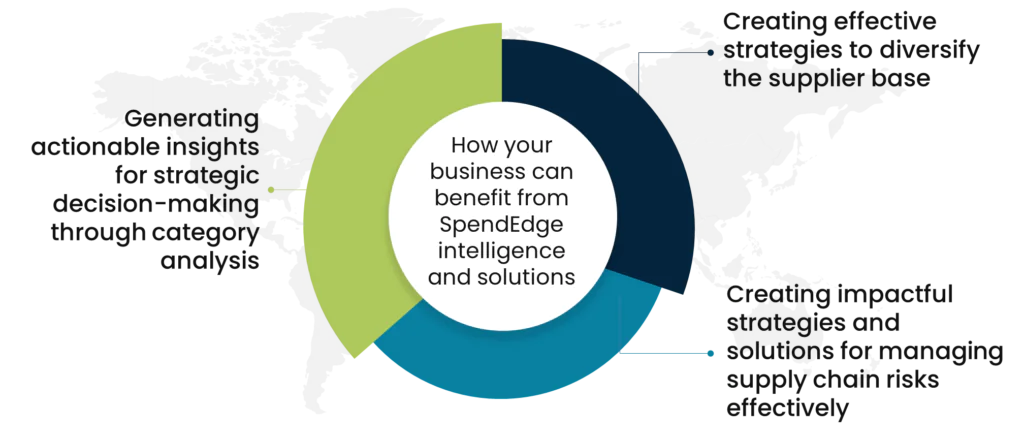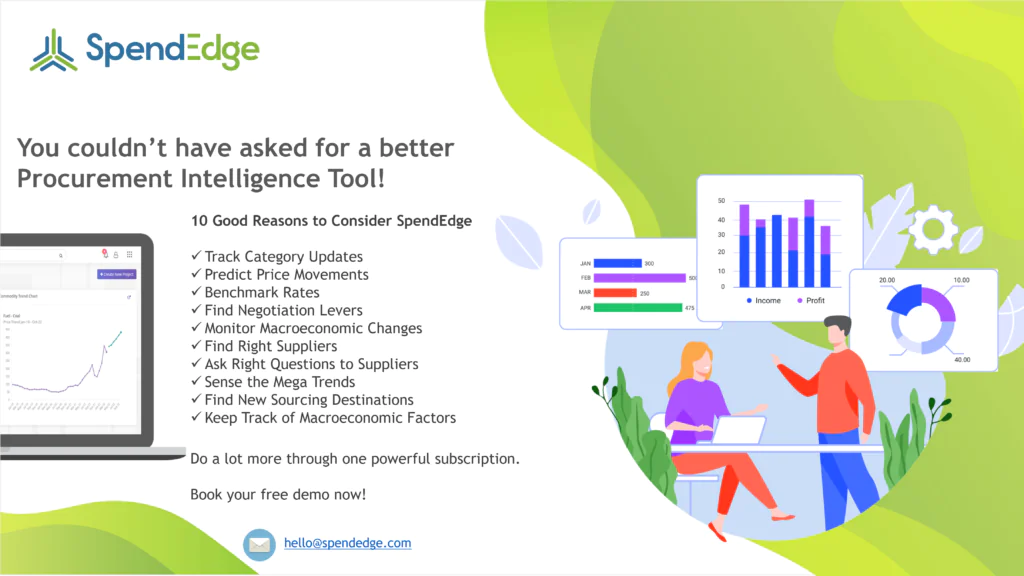By: George Mathew
In the current unpredictable business environment, procurement emerges as a pivotal defense against disruptions in the supply chain. Amid escalating geopolitical tensions, inflation, climate-related disasters, and increasing technological intricacies, organizations rely on procurement to proactively identify and address risks. Through adeptly navigating these challenges, procurement has the power to turn them into strategic advantages, ensuring the resilience and sustainability of the company amidst uncertainty.
In order to address the challenges, procurement leaders must be prepared to adapt swiftly. They need to closely monitor market trends, supply chain disruptions, and cost fluctuations while leveraging technology and evaluating supplier performance. By staying informed and communicating effectively with senior management, they can make strategic decisions that ensure a resilient and cost-effective supply chain.
To have a clear understanding of all our services at SpendEdge
Factors that will influence the trajectory of procurement in the future:
Increasing impact of geopolitical tensions and conflicts on procurement
Geopolitical tensions exert a significant influence on procurement, resulting in operational disruptions, increased expenses, and trade route blockades. Consequently, companies are compelled to adhere to stricter regulations and sanctions, compelling procurement leaders to adopt proactive risk management measures. Vital strategies include diversifying production capacities and meticulous supplier management through mergers and acquisitions to safeguard business continuity. Collaboration among procurement departments, cross-functional colleagues, and suppliers is crucial for efficiently mitigating geopolitical risks and upholding supply chain resilience.
Uncertainty is mounting due to inflation and the looming prospect of a recession
Amidst rising inflation and the looming threat of recession, businesses face a challenging operational landscape impacting costs, revenues, and investment decisions. To mitigate strain on profits, companies are actively exploring ways to enhance margins, with procurement strategies emerging as a less disruptive means to bolster profits. An inflation-ready procurement function adopts a comprehensive approach, utilizing strategies like hedging and price-indexing while scrutinizing every price change. Ideation workshops and collaborative sessions with partners and suppliers often yield innovative ideas, facilitating margin enhancement beyond conventional commercial levers.
Frequent occurrences of natural disasters are on the rise
Over the past five decades, the frequency of natural disasters has surged, increasing fivefold, largely attributed to climate change and the rise in extreme weather events. These disasters present significant threats to commercial assets, properties, and essential raw materials. Procurement plays a crucial role in mitigating these risks, including disruptions to resource availability, shipping, and production efficiency and quality. To address these challenges, strategies may involve ensuring supply continuity by establishing redundancy in sourcing and manufacturing sites, thereby reducing reliance on a single supply chain.
Adoption of climate sustainability goals is rapidly gaining momentum
Governments worldwide are implementing stricter carbon regulations, prompting more companies to embrace net-zero climate goals and pursue decarbonization strategies. Procurement functions are instrumental in advancing these endeavors by involving strategic suppliers in sustainability initiatives, demanding commitments to diminish Scope 3 emissions, and prioritizing sustainable raw material procurement. This cooperative approach is critical for companies striving to diminish their environmental footprint and attain lasting climate sustainability.
Advanced technology is propelling efficiency to new heights
Next-generation procurement technologies such as artificial intelligence (AI), blockchain, and the Internet of Things (IoT) are increasingly indispensable for companies navigating complex operations. AI streamlines workflows, reduces errors, and enhances decision-making, while blockchain ensures transparency and security in transactions. IoT enables real-time monitoring of inventory and predictive maintenance. Strategically investing in these technologies is essential for organizations to achieve targeted business outcomes, such as improved inventory management and operational efficiency.
Escalating scarcity of skills is significantly impacting procurement operations
In the forthcoming years, procurement functions are poised for transformation, driven by an increasing need for category managers adept in advanced analytics and cutting-edge tools. Nonetheless, labor shortages present hurdles in securing specialized talent. To confront this challenge, procurement leaders must reevaluate their operational frameworks and formulate talent development strategies aligned with strategic goals. A well-rounded procurement team places a premium on category management while streamlining repetitive tasks through automation to enhance efficiency. Additionally, it strategically leverages specialized skills where they are most beneficial.
How SpendEdge can assist procurement leaders in strategic decision-making:

Creating effective strategies to diversify the supplier base
Our sourcing advisors play a pivotal role in optimizing processes, implementing best practices, and minimizing waste. Through extensive market research, they develop effective strategic sourcing solutions to mitigate risks and bolster resilience in times of crises. Offering valuable insights, they identify a diverse array of suppliers emerging from prime sourcing countries. They meticulously evaluate factors including costs, transportation, quality, labor availability, and proximity, empowering organizations to make informed decisions and embrace cost-effective procurement strategies.
Creating impactful strategies and solutions for managing supply chain risks effectively
Our procurement advisors offer expert guidance and recommendations to businesses during purchasing decisions. Specialized advisors assist clients in remaining informed about supply chain advancements, including monitoring supplier capabilities, disruptions, regulatory shifts, and global market changes that could affect operations. Additionally, they evaluate the impact and probability of these factors and devise strategies to mitigate or eradicate associated risks.
Generating actionable insights for strategic decision-making through category analysis
Our procurement advisors assess the specific needs and requirements within each procurement category, which includes understanding cost drivers, market trends, evaluating supplier capabilities, implementing robust engagement practices, and identifying potential sourcing risks. Through comprehensive category analysis, our specialized advisors offer insights into the critical factors influencing procurement decisions.
Success Story: How we helped the prominent retail company in mitigating the challenges due to unforeseen events:
Our client is a leading French retail company, offers a range of electronics and household products through its extensive retail chain.
The client faced significant challenges in its supply chain due to unforeseen events, affecting both supply availability and costs.
Our experts at SpendEdge conducted a comprehensive market analysis, optimizing sourcing strategies by recommending a supplier diversification plan for increased flexibility and risk mitigation. They analyzed cost drivers, identifying areas for optimization and negotiating favorable terms. Additionally, our experts utilized emerging technologies for real-time market intelligence, enabling proactive decision-making. They also adopted best practices in demand forecasting and inventory management to enhance supply chain efficiency.
Our solutions contributed to improving the client’s supply chain resilience, minimizing the effects of disruptions on product availability. Additionally, they achieved cost savings by strategically negotiating, diversifying suppliers, and streamlining processes.

Contact us now to solve your procurement problems!
Author’s Details
George Mathew
Associate Vice President, Sourcing and Procurement Intelligence
George is a procurement specialist at Infiniti Research and provides advisory services to clients across the pharmaceutical, CPG & FMCG, energy, and automotive sectors. He specializes in the procurement areas of industry benchmarking, cost modeling, rate card benchmarking, negotiation advisory, and supplier intelligence.




